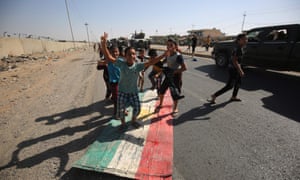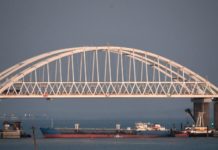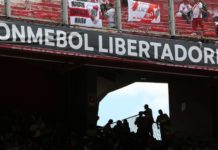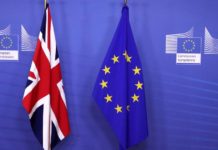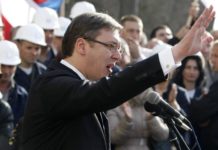US military rushes to defuse looming crisis in Kirkuk after Iraqi army advances
Martin Chulov in Erbil, Julian Borger in Washington and Saeed Kamali Dehghan in London
US commanders actively trying to mediate between two sides in the oil-rich city after forces loyal to the government in Baghdad seized control on Monday.
US military commanders are scrambling to stop a conflict escalating between two forces they arm and train, after the Iraqi army seized the contested, oil-rich city of Kirkuk, from Kurdish peshmerga.
The Pentagon sought to play down the scale of clashes between the two sides, after forces loyal to the central government in Baghdad rapidly took over nearly all the city on Monday, and Kurdish forces abandoned their positions, retreating to nearby oilfields. Video footage showed streams of Kurdish refugees leaving Kirkuk in cars.
Baghdad’s move came three weeks after a referendum on Kurdish independence included the ethnically diverse oil city – a contentious move that Baghdad viewed as an effective annexation.
The peshmerga withdrawal delivered decisive military and political gains to Baghdad and a devastating blow to the Kurdish region’s de facto president, Massoud Barzani, who had staked much of his legacy on the referendum and aimed to use it as a stepping stone to consolidate Kurdish autonomy.
Col Robert Manning, a Pentagon spokesman, described the takeover, as “coordinated movements, not attacks” and said an exchange of fire that is reported to have resulted in several casualties was “an isolated incident”.
“We have not seen levels of violences suggested in some of the media reports,” Manning said, urging both parties to focus on the “common threat” of the Islamic State. “This is certainly not helpful and again we encourage both sides to not fight each other.”
He added that US commanders in the region were active in trying to mediate between the two sides in the city.
“Coalition leaders at all levels are engaging with their counterparts in the Iraq security forces to encourage dialogue and de-escalation,” Manning said.
Speaking at the White House, Donald Trump said: “We don’t like the fact that they are clashing, but we’re not taking sides.”
But the US embassy in Baghdad declared its support for Iraq’s reassertion of sovereignty in Kirkuk. “We support the peaceful reassertion of federal authority, consistent with the Iraqi constitution, in all disputed areas,” the embassy said in a statement.
The confrontation with Kurdish forces is a serious threat to US efforts to focus its allies’ efforts against Isis, an effort in which Kurdish forces have been Washington’s most effective partner.
There was also concern in Washington over the role of Iran in the move into Kirkuk. The Iraqi army advanced alongside mostly Shia Popular Mobilisation Units (PMU), which are Iranian-backed.
“I am especially concerned by media reports that Iranian and Iranian-backed forces are part of the assault. Iraqi forces must take immediate steps to de-escalate this volatile situation by ceasing their advances,” Senator John McCain said in a written statement.
“The United States provided equipment and training to the government of Iraq to fight Isis and secure itself from external threats – not to attack elements of one of its own regional governments, which is a longstanding and valuable partner of the United States.”
Manning said the Pentagon had been assured by the Iraqi government and security forces that they would use US equipment “in accordance with US law and our bilateral agreements”.
“If we receive reports that US-origin equipment is being misused or provided to unauthorized users, we engage the Iraqi government in conjunction with the US embassy to address any confirmed issues – up to the highest levels, if necessary,” Manning added.
He also said he was not aware of any direct Iranian involvement in the Kirkuk operation though the head of the Islamic Revolutionary Guard Corps (IRGC) Quds force, Gen Qassem Suleimani – and PMU officials loyal to Iran’s supreme leader – are reported to have directed the offensive.
